
The Great Debate
On television, radio, and in writing, we often hear two political ideologies debating the issue of climate change. One side swears the change is merely a natural cycle and the minuscule impacts of mankind cannot be detected. The other side places all of the responsibility on mankind and our irresponsible burning of fossil fuels in the quest for cheap energy. Often with a lack of credible references, they argue back and forth, their perspectives unwavering. The discussion ends with no real progress being made, and there remains an uncomfortable tension that permeates and divides the world.We are conditioned to process information that has been distilled into an oversimplified format and this can lead to 'tunnel vision'. With arguments it is much easier to favor a straightforward explanation and 'pick a side' than it is to objectively examine both sides and acknowledge the validity that exists throughout. As with most things in life, the answer is neither black nor white, rather an ever-changing shade of gray. Only by honestly examining facts from all perspectives can we make our own conclusions about the reality of climate change.
Natural Cycles
The climate of our planet is unquestionably influenced by several predictable celestial cycles. Some of these cycles are intuitive like the daily rising and setting of the sun caused by the spinning rotation of the earth on it's axis, or the annual changing of the seasons due to the axial tilt and revolution of Earth around the sun. The axial spin and orbital revolution of the earth are not perfect,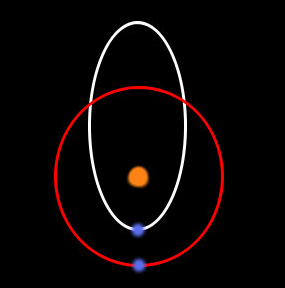 Showing Earth (blue dot) in an elliptical orbit (white) and a circular orbit (red) around the sun (orange dot).
Showing Earth (blue dot) in an elliptical orbit (white) and a circular orbit (red) around the sun (orange dot). Eccentricity of the Orbit
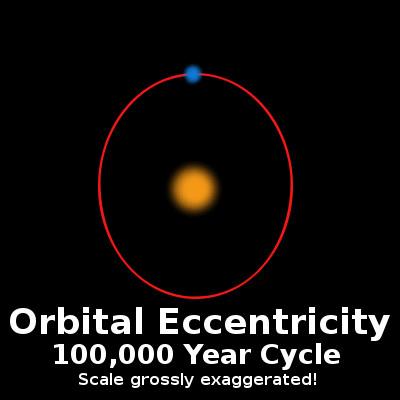 Earth's (blue dot) orbit (red ellipse) around the sun (orange dot) as it changes with time
Earth's (blue dot) orbit (red ellipse) around the sun (orange dot) as it changes with timeObliquity of the Axial Tilt
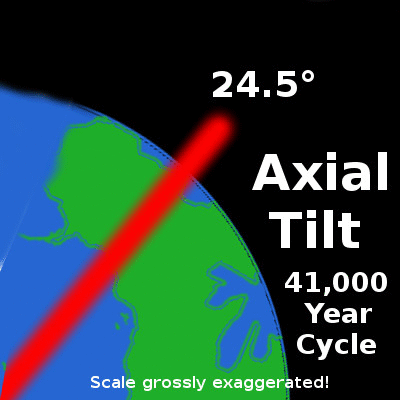 Minor changes in the tilt of the axis have large impacts on the amount of solar radiation the polar regions receive.
Minor changes in the tilt of the axis have large impacts on the amount of solar radiation the polar regions receive.Precession of the Axis
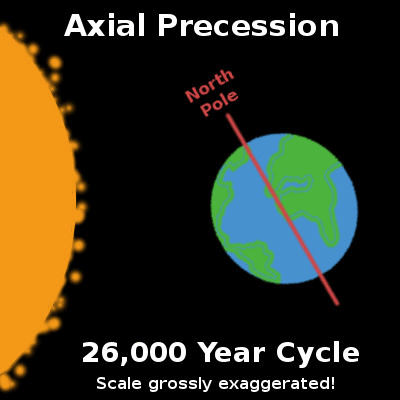 Two-dimensional representation of the effects of a circular precession. The pole is tilted ~23 degrees throughout this cycle; when the poles appear to be vertical they are actually tilting toward and away from the screen.
Two-dimensional representation of the effects of a circular precession. The pole is tilted ~23 degrees throughout this cycle; when the poles appear to be vertical they are actually tilting toward and away from the screen.Precession of the Orbit
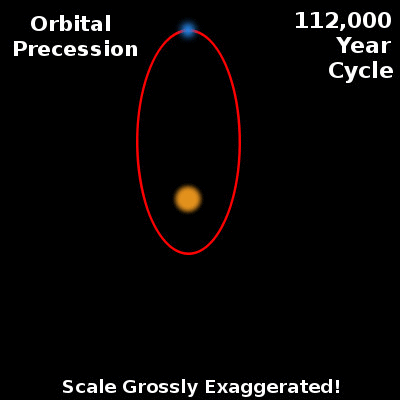
Incline of Orbit
A final cyclical variation in the orbit of Earth has to do with the plane of orbit around the sun. Milankovitch was unaware of this cycle and did not study it, but like orbital eccentricity it lasts approximately 100,000 years. There is some speculation that the additive effect of these cycles may trigger the onset of global ice ages.Accuracy of Data
The only way that historical climate data can be collected is through a proxy. The two most common proxies used to estimate prior climate conditions are the composition of gas bubbles trapped in ice cores and the intensity of different indicators in an analysis of deep ocean sediment.While a great deal of information can be gleaned by these indicators, their precision is limited in accuracy due to the indirect nature of the measurements. It is impossible to know exactly how rapidly or intensely the climate has changed in the past. Cycles that seem impossibly gradual in human time are rather abrupt in geologic time.
End Part 1
I have elected to break this topic into multiple parts in the interest of encouraging readers to read through the entire article (and for my own convenience). In the next post, we will consider other possible factors in climate change and how they compare to the Milankovitch cycles. Please follow and stay tuned for future elaboration on these concepts!All photos and animations by the author, except the lead photo from Pixabay. See sources and additional reading as embedded links in the article!
External Resources:Milankovitch, M. "Canon of insolation of the earth and its application to the problem of the ice ages." Royal Serbian Academy Press, Cemian (1941): 1-626.

Therefore climate change is a natural process, and our consumption of fossil fuel and burning coal is not a culprit. In my opinion even the deforestation could nothing to do with the climate change. The ocean is a huge refinery of oxygen. However, the extinction of animals may link to deforestation.
If it were that simple I would not need to break this post into multiple parts. Please stay tuned for future installments!
The problem of burning fossil fuel is that there is an addition of CO2 to the carbon cycle. This works in a similar way with deforestation. A large amount of potential CO2 is stored as carbon in trees. Deforestation takes carbon away from the storage and puts it into the atmosphere as CO2. A higher concentration of atmospheric CO2 increases temperature due to the greenhouse-effect. So my question is how in your opinion deforestation does not add to climate change?
Currently it's mainly a carbon sink, which is the reason why the CO2 in the atmosphere isn't already much higher. But while the oceans get more sour and hotter, that also has a limited capacity.
This is a well written piece on one subset of contributing factors to our climate. Looking forward to what you have to say about other contributing factors.
As a side note... I don't think earth ever approaches an orbital shape as elliptical as you show in the eccentricity section. I realize you said the scale was exaggerated, so I suspect you are just trying to illustrate the concept.
Thank you for the praise! You are absolutely right, the orbit is very close to circular and the eccentricity is quite minimal. Still, this difference has a profound impact on the amount of radiation received. The animations are quite exaggerated, but I couldn't think of a better way to illustrate it.
It may be a couple weeks before the next part - there is so much to consider!
Well I am sure what ever you decide to go with it will be equally as informative as this nice post.
Interesting post. I think that we need to take part and try to stop global warming and other effects on climate change. If the earth's temperatures continue to rise in the future, living things on earth would become extinct due to the high temperatures. If humans contribute to control global warming, this world would be cooler and the high temperatures we currently have would decrease. If everybody as one take stand and try to end most of the climate changes that are occurring, this world would be a safer place to live on.
Thanks for your reply! I like your thoughts and your approach to this problem. I agree that being proactive is a good approach, but some of the causes of climate change are entirely out of our control. I will discuss the causes that we have control over in upcoming posts, so stay tuned!
I am so tired of mainstream media peddling one sided articles on climate change and alleged man made global warming . Your article is most refreshing - how dare anyone challenge the Cabal? Let us hear and see more information on this platform that is not censored (yet)!
You are misinterpreting everything. Climate change is contributed to by a variety of factors. Anthropogenic ones are the only ones under our control, and they are also generally warming contributors. This post challenges nothing, it just presents more contributing factors, ones which are taken into consideration in climate models.
@originalworks
To call @OriginalWorks, simply reply to any post with @originalworks or !originalworks in your message!
For more information, Click Here!
To enter this post into the daily RESTEEM contest, upvote this comment! The user with the most upvotes on their @OriginalWorks comment will win!Special thanks to @reggaemuffin for being a supporter! Vote him as a witness to help make Steemit a better place!
The only people whose opinion about climate change should be considered valid are those holding Doctoral Degrees in Climatology. Their position is unambiguously and nearly unanimously directly opposite to yours. The position that it is caused by factors other than burning carbon is a lie supported with vast sums of money from the fossil fuel industry.
You are not quite correct. it is not only carbon, but also other stuff we put in the air, like methan (the famous smelly cows).
Thank you for your comment and concern. Please recognize that this is just the first part in a series of articles that I plan to write discussing climate change. The topic has too many considerations to put them all into one post. I believe most people holding Doctoral Degrees in Climatology would agree that Milankovitch cycles have influenced the climate of our planet for billions of years. Stay tuned in the coming weeks for a discussion about the burning of carbon and what impact it might have. I am doing my best to give a fair perspective from both sides, and will consider both together in the final installment of this series.
To be completely clear I very much doubt that you are conducting an objective assessment. I think it far more likely that you are pumping a political ideology or are simply a troll. I will not waste my time further with this discourse other than to say that anybody who takes you at all seriously is a fool, and I advise them to write a letter to the Chair of Climatology at any respected, accredited university. I have done so, and so should you.
The beauty of this world is that you are entitled to believe whatever you choose. I assure you I am neither a troll nor someone trying to pump a political ideology, just a geologist attempting to discuss an extremely polarizing issue. There is no need to call other people names in an attempt to undermine my credibility. I encourage you to direct your favorite Doctor of Climatology to check out the posts and see if they agree!
If you hold a Doctorate you should know better than to publish such a feeble exercise in false equivalence. Are you interested in the opinions of Gastroenterologists about tectonic plate movements? No? That's essentially what you're doing.
I think that even the climatologists you mention will agree that it is too simplistic to reduce the whole climate change issue to one single factor. This is exactly what the author is saying. There are several factors and this post discusses only one of them. The author has never said human beings were not related to the issue. The author has never said that the discussed factor was the driving one.
The nonsense that this pretend expert dispenses has been refuted countless times. As I said, get in contact with an actual climatologist. Write to the department chair at your State University. Personally I have communicated on this issue with the Chair of the National Academy of Sciences.
click here.Congratulations @gra, this post is the third most rewarded post (based on pending payouts) in the last 12 hours written by a User account holder (accounts that hold between 0.1 and 1.0 Mega Vests). The total number of posts by User account holders during this period was 1168 and the total pending payments to posts in this category was $1815.41. To see the full list of highest paid posts across all accounts categories,
If you do not wish to receive these messages in future, please reply stop to this comment.
Good post friends plez upvote my post plez
The intellectual dishonesty in the climate debate is astonishing to me. When you are diagnosed with some rare disease everyone tries to find the leading expert to cure themselves, and maybe you get a second opinion from another expert.
The vast majority of climate scientist (i.e. the experts) agree that the earth is heating and human efforts are a significant cause. But no now let's not listen to the experts. It's baffling.
@gra I am curious about which stage we are in with the natural cycle. I've heard that we are in the cooling regime of the natural cycle. Therefore, disregarding other factors, we would expect a cooling of the climate. Do you know anything about whether this true?
As @lennstar says, there are many factors and some of them are having contrasting effects. It might be better to think of it less as 'cooling' and 'heating' and more as an increase or decrease in how severe the seasons are. The eccentricity of the orbit is currently decreasing and a more circular orbit will make the seasons more mild / less extreme everywhere. Similarly, the axial tilt is decreasing which will also make the seasons less severe. The axial precession is at one extreme, which means in the future the seasonal changes will be getting more severe in the Northern Hemisphere and less severe in the Southern Hemisphere. The weight that each of these factors carry in influencing global climate relative to anthropogenic sources is still a hotly contested issue, but I'll try to address this more in depth in one of the later parts of this article.
@gra that makes it more clear, thanks for the information. I will be keeping an eye on your future work!
That is true, most (of course not all, since there are many) natural factors are in a cool or cooling phase.
No, that is wrong. There are the scientists and there are (mainly in the US) people who just don't want to believe the scientists in the most researched topic in human history.